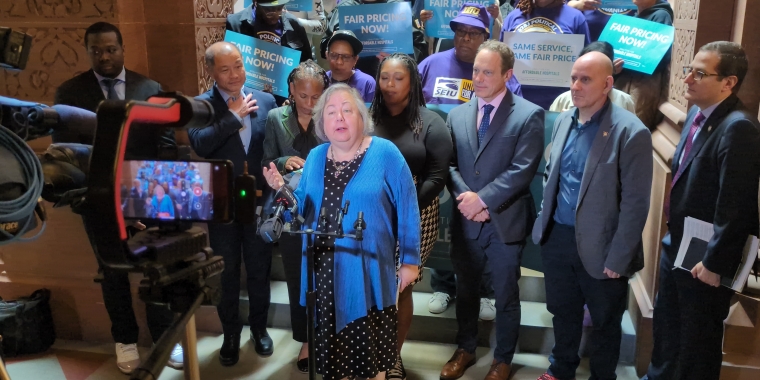
East Side Electeds Express Extreme Disappointment over DEC Marine Transfer Station Decision
Liz Krueger
July 28, 2009
-
ISSUE:
- Construction
New York—East Side elected officials joined together in expressing their extreme disappointment over the Department of Environmental Conservation’s (DEC) decision to approve permits for a Marine Transfer Station (MTS) at East 91st Street. In response, the Gracie Point Community Council is investigating the possibility of filing an Article 78 lawsuit with the State Supreme Court in order to block the DEC’s decision. For years the East Side electeds and the community have actively opposed the siting of an MTS at East 91st Street.
“Regardless of the outcome of the lawsuit, the DEC’s decision is another step toward making an ill-conceived plan to build an MTS at East 91st Street a reality,” said Senator Krueger. “I find it disheartening and disappointing that the DEC has signed off on placing a marine transfer station for trash right in the middle of one of New York's most populated residential neighborhoods."
A MTS located at 91st Street will have extremely damaging effects on area parks, traffic, noise, air quality and public health. According to census data from 2000, 13,500 people live within a quarter mile of the proposed site, including 1,850 children, 1,622 senior citizens, and more than 1,500 people living below the poverty line. The next most populated community in which the City proposes to locate a MTS, Hamilton Avenue in Brooklyn, has less than 4,300 people living within a quarter of a mile. Additionally, unlike 91st Street, all the other proposed MTS sites are separated from the closest residences by a commercial zone.
The residential neighborhood surrounding the proposed location is also home to one of the city's largest recreation facilities, Asphalt Green. Asphalt Green has 675,000 visitors annually; 110,000 of these visits are made by local public school children who rely on the space for recess and after-school programs. If built, the station would serve as a hub for thousands of tons of trash brought to the station every day by an endless hundreds parade of dump trucks—right through Asphalt Green.
In the DEC’s decision they explained there was no reason to block the building of the Marine Transfer Station at East 91st Street “because no substantive and significant issues have been raised for adjudication.” This rationale was used as the measure by which all of the community’s issues were dismissed.
"I have long been a strong supporter of the environmental justice movement in New York City and believe that we all must be responsible for our own garbage. However, the question at hand is whether marine transfer stations should be located in any residential community," Krueger stated. "I oppose the construction and use of marine transfer stations in any residential neighborhood in any borough. The high population density, as well as the park and recreational purposes of this specific area make this a particularly poor plan."
““In addition to the environmental damage that the siting of the Marine Transfer Station will inflict on a purely residential area -- the only such entirely residential neighborhood in New York City slated for such a facility – the DEC’s disappointing decision ignores the risks posed by siting this facility smack in the middle of what the City’s own Office of Emergency Management has identified as a “Hurricane Zone A”, a location where the highest risk of flooding from a hurricane’s storm surge exists. If a hurricane or other significant storm was to hit the transfer station, the surrounding neighborhoods could be permeated with water-borne bacteria and diseases, which would threaten the welfare of the population and create a public health nightmare,” said Congresswoman Carolyn Maloney.
“This fight is far from over. In the Assembly, I continue to push my bill (A.6829) to prohibit waste transfer stations from being sited within 800 feet of public housing. It’s shameful that the Mayor insists on putting so much pollution in the heart of a dense residential community—not to mention a block away from where the DOE just announced a new public elementary school will open this fall,” said Assembly Member Micah Z. Kellner.
Assemblyman Jonathan Bing said, "I am disappointed by the recent decision of the Department of Environmental Conservation to approve permits for the Marine Transfer Station at 91st Street. The approved location is in the heart of a dense residential district that includes the Stanley Isaacs Neighborhood and Holmes Towers, as well as Asphalt Green. This is a big loss for residents in this area, whose quality of life will undoubtedly diminish."
“The bottom line is that garbage stations don’t belong in residential neighborhoods,” Council Member Jessica Lappin said. “The DEC is making a mistake not acknowledging that. In making this decision, the DEC is ignoring the serious harm to the community that will be done by following through on this ill-conceived plan.”
“Opening the 91st Street Marine Transfer Station would completely undermine a stable residential community," said Council Member Dan Garodnick. “We will continue to fight against this plan in order to protect residents from harmful exhaust fumes and the stink of garbage. We should never put a garbage station in a residential area, ever.”
-30-
Share this Article or Press Release
Newsroom
Go to NewsroomSenator Krueger's May 2025 Update
May 30, 2025


